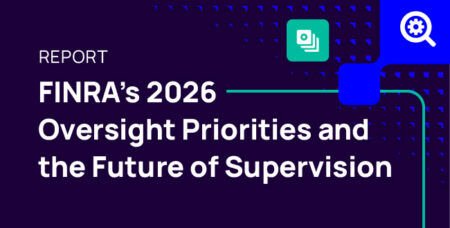In Case You Missed It: Key Compliance and AI Insights from AFME C&L 2025
TL;DR: At AFME C&L 2025, regulators and industry leaders outlined a future where AI, data governance, and culture define effective compliance. Across sessions, firms expressed a cautious but growing embrace of AI and data-led compliance, emphasizing that true progress requires balancing technology, sound governance, and ethical practices.
Global trade wars. Deregulation. Possible furlough of enforcement staff. Government shutdown. Geopolitical tension.
Amid these global shifts, many in the financial services industry are rethinking their compliance priorities and investment strategies. At the AFME European C&L Conference in London, we had the opportunity to hear directly from regulators and industry leaders about how they’re adapting. Here are some of the key takeaways.
Why these insights from AFME C&L 2025 matter to you
You can't afford to get left behind. Get up to speed on the top AI and compliance trends shaping 2026 — straight from regulators and industry leaders at AFME C&L 2025. Learn where the FCA is focusing next and how firms are balancing AI innovation, data governance, and culture to strengthen compliance.
Simplification, not deregulation: The FCA’s 2026 agenda
The conference was headlined by Therese Chambers, the FCA’s Head of Enforcement, who outlined the regulator’s focus heading into 2026.
Chambers highlighted that, much like US regulators, the FCA aims for a simplification of rules to reduce regulatory burden while improving enforcement speed — a critical factor in building market confidence and driving investment in the UK.
The FCA’s top enforcement priorities remain consistent:
- Crypto asset compliance
- Insider dealing
- Non-financial misconduct (NFM)
- Off-channel communications
Chambers emphasized the FCA’s ongoing coordination with international regulators, referencing collaboration with nine global agencies (excluding the US) to combat “finfluencer” crimes.
While she avoided commenting directly on possible changes to US enforcement of the Foreign Corrupt Practices Act (FCPA), she predicted that divergence between the UK and US will likely emerge in areas such as ESG and DEI priorities.
AI in financial compliance: Opportunity meets caution
Chambers described the FCA as “excited about AI,” noting its potential use of agents and large language models (LLMs) in enforcement. Yet, her optimism came with a “fingers crossed” caveat, reflecting a measured, cautious approach.
That caution wasn’t universal. Panelists and attendees mentioned AI in nearly every session, even when it wasn’t on the official agenda. Sessions like “Embracing the AI Revolution” explored AI’s growing role in compliance and legal functions, while others debated its use across first- and second-line surveillance.
Still, the prevailing sentiment mirrored the FCA’s restraint: most firms are prioritizing low-risk, internal AI use cases until enforcement precedents emerge under the EU AI Act or from the FCA itself.
Data governance takes center stage
Data has become the backbone of compliance discussions, particularly as AI adoption grows. At both AFME and SIFMA events, data governance and data-centricity have emerged as top priorities.
I had the privilege of moderating a panel of practitioners, regulators, and governance leaders exploring what it means for firms and regulators to become truly data-centric.
The conversation covered:
- The growing risk surface of data volume and variety
- The premium on data quality, integrity, and lineage
- How firms can unlock value by using data more effectively across business functions
A live audience poll revealed that roughly two-thirds of attendees view becoming “data-led” as very important to their business strategy — underscoring how essential data management is to both risk mitigation and business growth.
Beyond technology: Addressing non-financial misconduct (NFM)
In contrast to the technology-heavy sessions, a panel led by Shaun and moderated by Lucy McNulty explored the behavioral drivers behind harassment and workplace conduct issues — the human side of compliance.
Panelists discussed the FCA’s focus on non-financial misconduct and questioned whether it has truly changed organizational behavior. One panelist suggested rethinking the old adage, “hire for character, promote for talent,” proposing instead that firms prioritize cultural alignment at every level.
The takeaway was clear: responsibility for fostering ethical culture extends beyond HR. Compliance leaders and executives must be active participants.
While technology (including AI sentiment analysis tools like ChatGPT) can help surface early signals of misconduct, real progress depends on cultivating a culture of integrity and reinforcing positive behavior throughout the organization.
The global compliance outlook: AI, data, and culture
Global financial markets are navigating unprecedented upheaval. While the macroeconomic forces remain unpredictable, the mission of compliance is unchanged: to manage risk, build trust, and uphold integrity.
The role of AI — along with smarter data governance and stronger workplace culture — will only grow more central to how firms and regulators operate.
Congratulations to James Kent, Louise Rodger, and the AFME team for hosting such a productive and thought-provoking event. AFME C&L 2025 offered valuable insight into the evolving intersection of AI, data, and ethics in global financial compliance. Our team looks forward to continuing the conversation.
What’s next: Smarter, connected compliance
As regulators, firms, and technologists navigate this new era, one message is clear: data, AI, and culture must work together to strengthen compliance. At Smarsh, we’re helping organizations build that connection — enabling smarter data use, AI-driven insights, and a culture of integrity that meets the moment.
Frequently asked questions (FAQs)
Share this post!
Smarsh Blog
Our internal subject matter experts and our network of external industry experts are featured with insights into the technology and industry trends that affect your electronic communications compliance initiatives. Sign up to benefit from their deep understanding, tips and best practices regarding how your company can manage compliance risk while unlocking the business value of your communications data.
Ready to enable compliant productivity?
Join the 6,500+ customers using Smarsh to drive their business forward.





Subscribe to the Smarsh Blog Digest
Subscribe to receive a monthly digest of articles exploring regulatory updates, news, trends and best practices in electronic communications capture and archiving.
Smarsh handles information you submit to Smarsh in accordance with its Privacy Policy. By clicking "submit", you consent to Smarsh processing your information and storing it in accordance with the Privacy Policy and agree to receive communications from Smarsh and its third-party partners regarding products and services that may be of interest to you. You may withdraw your consent at any time by emailing [email protected].
FOLLOW US